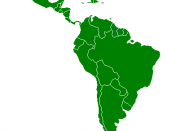Jurisdiction and Competence - Applicable International Laws and Source.
After having defined the legal and historical facts surrounding the Bolivia-Chile situation, the question arises as to the underlying principles and how the claim of revision is sourced by international law and organizations of international competence. First, we must briefly define boundaries and then portray as objectively as possible under what bases of international legality that this 100 year old Feud has regained international steam.
States with common borders share a minimum degree of "relation," and cannot aver to be able to totally ignore each other. In fact, boundaries create a prima facie hostile situation, since "my neighbor is my enemy" (Nordquist, 17). Boundaries are by definition shared. They define a state territorially and provide in this way a condition for state sovereignty, they are based both on internal and international legislation: boundary agreements are international legal document (Prescott, 5).
During this century, conventions formulated several international documents, from the UN Charter to regional international papers; (which will be examined below) specify directly or indirectly that changes of inter-state boundaries are acceptable only through peaceful means (Prescott).
Yet, crisis situations where boundaries or boundary-related issues are at stake are recurrent in the international system. Such occurrences place boundaries on the agenda of international law.
The addition of Bolivian land-locked problem into the Agenda of IX the Assembly of the Organization of American States and the consideration that is bestowed upon it is supported by firm legal foundations, enunciated in the United Nations Charter. In effect, in this document's article 14, it reads that "the General Assembly may recommend measures for the peaceful adjustment of any situation, regardless of origin, which it deems likely to impair the general welfare or friendly relations among nations, including situations resulting from a violation of the...


